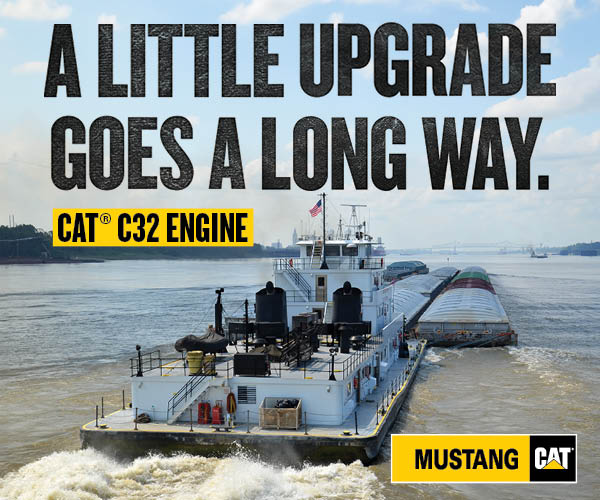Washington, D.C.—Top leaders from both sides of the U.S. Capitol remained optimistic they will reach a full-year funding deal for the government as members of the waterways industry hope for assistance in recovering from the ongoing pandemic.
“We will pass an omnibus,” House Speaker Nancy Pelosi (D-Calif.) told reporters. “We are on a good path to do that.”
In a separate press event, Senate Majority Leader Mitch McConnell (R-Ky.) said Congress would stay on course for full-year funding legislation by a December 11 deadline if appropriators reach an agreement on top-line figures for the 12 annual spending bills by the weekend.
McConnell recalled that both sides in past years agreed to stick to a two-year-old budget agreement and avoid so-called “poison pills.”
“I hope we can replicate that successful pattern this year,” he said.
Both McConnell and Pelosi say they want to pass an omnibus package by December 11, when the current stopgap measure expires.
Members of the waterways industry welcomed action on the fiscal year 2021 appropriations process, which has been stalled in the Senate.
“Congress clearly hears the nation’s need for strong and resilient infrastructure and supply chains based on the spending levels in both the Senate and House appropriation bills relating to America’s ports,” American Association of Port Authorities (AAPA) President and CEO Christopher Connor said.
AAPA noted the House versions passed during the summer included funding levels for port-related programs generally higher or equal to those in the recently released Senate bills, except for the Energy and Water funding measure.
While applauding that measure’s higher amount for the U.S. Army Corps of Engineers’ coastal navigation program, Connor said AAPA will be advocating for bills that provide the “greatest funding for America’s ports and port-related projects and programs.”
He said attention must be given to the maritime industry and to ports specifically as the country comes back from the economic precipice imposed by the pandemic.
“It’s critical that America’s seaports and our supply chain remain intact and able to facilitate this recovery, and that continued investments be made in our nation’s trade infrastructure to put Americans back to work,” Connor said.
COVID Relief Impasse
A months-long impasse on passing another coronavirus relief package continued with no signs of serious negotiations that could lead to a compromise.
Senate Majority Leader Mitch McConnell (R-Ky.) continued to push a “targeted” bill with an expected price tag of about $500 billion.
McConnell, however, has not been able to get his legislation through the Senate, where rules usually require 60 votes to pass legislation of such major significance.
House Speaker Nancy Pelosi (D-Calif.), who believes a broader package is needed, has pushed for a package costing roughly $2 trillion.
President-elect Joe Biden weighed in, encouraging lawmakers to pass legislation during the current lame duck session, but so far neither Biden nor a rising toll of the virus has broken the stalemate.
Great Lakes ESI Maps
The Senate passed a bill by unanimous consent requiring the Great Lakes Environmental Sensitivity Index (ESI) maps to be updated for the first time in two decades and periodically in the future.
“There’s no reason Great Lakes maps shouldn’t be updated just as frequently as East and West Coast maps,” said Sen. Gary Peters (D-Mich.), who sponsored S. 1342, the Great Lakes Environmental Sensitivity Index Act.
“The Great Lakes are more than an economic engine and resource—they are simply in our DNA as Michiganders. They must be protected for future generations.”
According to Peters, new ESI maps will provide more accurate assessments of coastal resources that are at risk of severe damage or a natural disaster.
FMC User Fees
The Federal Maritime Commission (FMC) requested comments on a direct final rule updating its current user fees and amending the relevant regulations to reflect the changes.
The rule takes effect without further action on January 27 unless significant adverse comments are filed prior to December 14.
If significant adverse comments are received, FMC stated it will publish a withdrawal of the rule in the Federal Register no later than December 28.
In its Federal Register notice on November 13, FMC discussed changes in user fees that result in more than a 10 percent increase or decrease for Record Search and Document Duplication, Passenger Vessel Operator Performance and Casualty Certificates and Ocean Transportation Intermediary License Application.
For additional information, contact Rachel Dickon at 202-523-5725.
MMA Entrance Requirements
The Maritime Administration is seeking comments on an interim final rule to allow it to waive the requirement for U.S. Merchant Marine Academy applicants to have taken the College Board’s Scholastic Aptitude Test (SAT) or the American College Testing (ACT) Program examination during a state or national emergency.
Prompted by disruptions caused by the ongoing COVID-19 pandemic, the rule took effect October 22.
Comments must be received by November 23 and may be submitted by the federal portal at http://www.regulations.gov, by U.S. mail or courier.
For additional information, contact Mitch Hudson 202-366-9373.
USS Cooperstown
In a warning to mariners in waters where regulations for preventing collisions at sea apply, the U.S. Navy announced that a Certificate of Alternate Compliance has been issued for USS Cooperstown.
Due to its special construction and purpose, the Navy explained in the Federal Register on November 13, it has been determined the vessel cannot comply fully with the navigation lights provisions of the International Regulations for Preventing Collisions at Sea, 1972 without interfering with its special function as a naval ship.
The Certificate of Alternate Compliance took effect November 13 and was applicable beginning November 11.
For additional information, contact Lt. Cmdr. Steven Gonzales at 202-685-5040.




